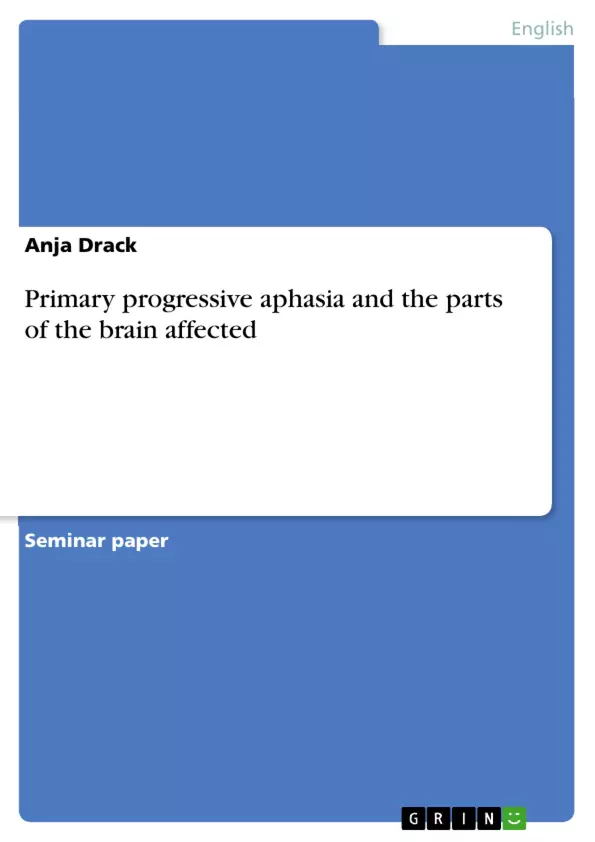Primary progressive aphasia is a relatively newly recognized subtype of dementia. Dementia is a clinical condition, in which a progressive decline of mental and emotional capacities occurs (Mesulam 2000:159). It affects fifty million people worldwide, with ten million new cases yearly (N.U. Dementia 2017). There is a wide variety of symptoms, including the loss or decline of memory, ability to focus, difficulties with reasoning, communication and language (Alzheimer's Society 2005:3), interfering with the independence of the daily living situation and activities (Mesulam 2000:159).
To this day, Primary progressive aphasia is often misdiagnosed, because of its unpopularity and therefore lack of knowledge of many people. Those misdiagnoses steal valuable time to find effective treatments, which, at least, could slow down the progressive nature of the illness. Studying the relationship between language impairments and affected parts of the brain in Primary progressive aphasia, allows us to reach a better understanding of the language network in the brain and pushes forward the search for effective treatments or even a cure.
This termpaper presents a review of literature, especially by Mesulam, on Primary progressive aphasia and the language impairments, declining progressively throughout the illness. The question this paper tries to answer is, what kinds of language impairments can be present in Primary progressive aphasia and which parts of the brain are responsible for certain deficits, when affected by different diseases. It will give information about the most common language impairments seen in patients, because no case is exactly the same and not everybody experiences the same difficulties. Furthermore, the paper will explore the language network of the brain, where it is located, which parts it includes and which parts play a role in Primary progressive aphasia, for short PPA.
To look at the clinical picture from another perspective, a 14- years follow-up case study will give an example of speech impairments of a patient diagnosed with Primary progressive aphasia and show the neuropathological findings of the affected brain parts, which are responsible for the specific impairments.
Inhaltsverzeichnis (Table of Contents)
- Introduction
- Primary progressive aphasia
- Language impairments and the affected parts of the brain of Primary progressive aphasia patients
- Case Study
- Critical review of the case study
- Conclusion
- Bibliography
Zielsetzung und Themenschwerpunkte (Objectives and Key Themes)
This term paper aims to provide a comprehensive overview of Primary Progressive Aphasia (PPA), a subtype of dementia that affects language function. The paper explores the relationship between language impairments and the specific brain regions affected by PPA, seeking to understand the language network in the brain and contribute to the search for effective treatments.
- Definition and characteristics of Primary Progressive Aphasia
- Impact of PPA on language function and its various clinical presentations
- Neurological basis of language impairments in PPA, including the affected brain regions
- The different subtypes of PPA and their distinct symptom profiles
- A case study examining the speech impairments and neuropathological findings in a PPA patient.
Zusammenfassung der Kapitel (Chapter Summaries)
- Introduction: This chapter introduces the concept of dementia, highlighting its prevalence and diverse symptoms, particularly focusing on the impact on language and communication. It introduces the specific focus of the paper on Primary Progressive Aphasia (PPA) and its significance in understanding language impairment and the search for effective treatments.
- Primary progressive aphasia: This chapter delves into the definition and characteristics of PPA, exploring its relationship to Frontotemporal lobar degeneration and its distinct subtypes. It discusses the progressive nature of PPA, the age of onset, and the neurological processes underlying the language impairments.
Schlüsselwörter (Keywords)
Primary Progressive Aphasia, Frontotemporal Lobar Degeneration, Dementia, Language Impairment, Aphasia, Brain Atrophy, Language Network, Neuropathology, Case Study, Clinical Variants, Nonfluent/agrammatic variant PPA, Semantic variant PPA, Logopenic variant PPA.
- Quote paper
- Anja Drack (Author), 2018, Primary progressive aphasia and the parts of the brain affected, Munich, GRIN Verlag, https://www.grin.com/document/493030



